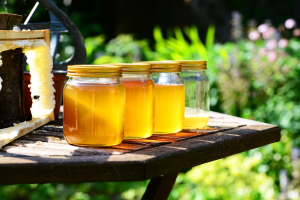By Christy Erickson
You may have heard that without bees, there would be no strawberries or almonds. This is likely true, but you could also say goodbye to about 70 out of the top 100 crops worldwide. The importance of bees in our ecosystem and for our food production cannot be overstated. Here’s why bees are nature’s perfect pollinators and what this means for your dinner plate.
The perfect little pollinator
Plants need assistance to pollinate. Pollination is basically the fertilization of the female part of a flower by pollen from the male part. Some flowers are self-pollinating, but the vast majority (over 80 percent) have to get a little help from their friends. The wind handles some of the duties. Birds, bats, and other insects do as well. But bees are the heavy lifters of the pollination community.
Bees are uniquely suited for pollination, as over time they have developed a symbiotic relationship with plants. In other words, bees need plants to survive and plants need bees to survive – it’s a perfect marriage. Plants attract bees through fragrant, brightly-colored flowers. Bees land on flowers, looking for pollen and nectar. Plants need bees to collect pollen and transfer it among flowers for reproduction, and bees need this pollen and nectar – it’s their only source of food. Bees are so perfect as pollinators because they tend to focus on one particular plant variety at a time when foraging, thus leading to incredibly efficient pollination.
Bee’s perfection as pollinators doesn’t stop there. Bees are very hairy, compared to other insects, so it’s easy for them to catch and trap pollen. Bees even regurgitate a bit of nectar to mix with the pollen mid-flight, making it stickier so it won’t fall off. You may think of bees as honey-producers, but only 4 of the 25,000+ species of bees are honey bees. The rest are simply going about their business pollinating the planet on a daily basis.
What this means for food production
All of this bee pollination doesn’t just translate to pretty flowers across the globe – it means that bees are directly responsible for a lot of the pollination that produces the food we eat on a daily basis. How much? Just shy of $200 billion worth of food crops rely on bees every year. One in every three bites of food you consume comes from bee pollination. Most vegetables, fruits, and nuts rely on bees, all of which are part of the balanced diet we need to build up our immune system, fight infection, and stay energized. Bees also pollinate plants used by grazing livestock, so some of your meat and dairy is also bee-reliant. Without bees, many of the foods you love may not cease to be, but they would surely cease to be readily-accessible, creating a negative impact on your health.
How you can help the bees
So, what can you do to promote colony growth? The most labor-intensive but beneficial thing is to build your own bee-friendly garden in your backyard. Get your family outside and digging in the dirt. You want to teach your kids the importance of backyard gardening from an early age. Plant a garden full of bright, fragrant flowers that bees love and never use pesticides. Shop organic when you can. Organic farmers use farming practices that promote bee colony growth, so your dollars are going to support bees. Only buy local honey, which will support small, local beekeepers who are doing their part to help protect bees.
Bees are facing a significant decline thanks to the actions of man – habitat destruction and pesticide use, to name a couple. It’s vital that everyone on Earth understands just how important these perfect pollinators really are to our planet’s biodiversity, and that they do whatever they can to spread the word and protect bees in their own backyards.
Photo Credit: Pixabay.com
Other resources: Flower Fragrances That Attract Bees and Butterflies to Your Garden (Thanks to MaryAnne B. for the tip!)
For more information, contact

